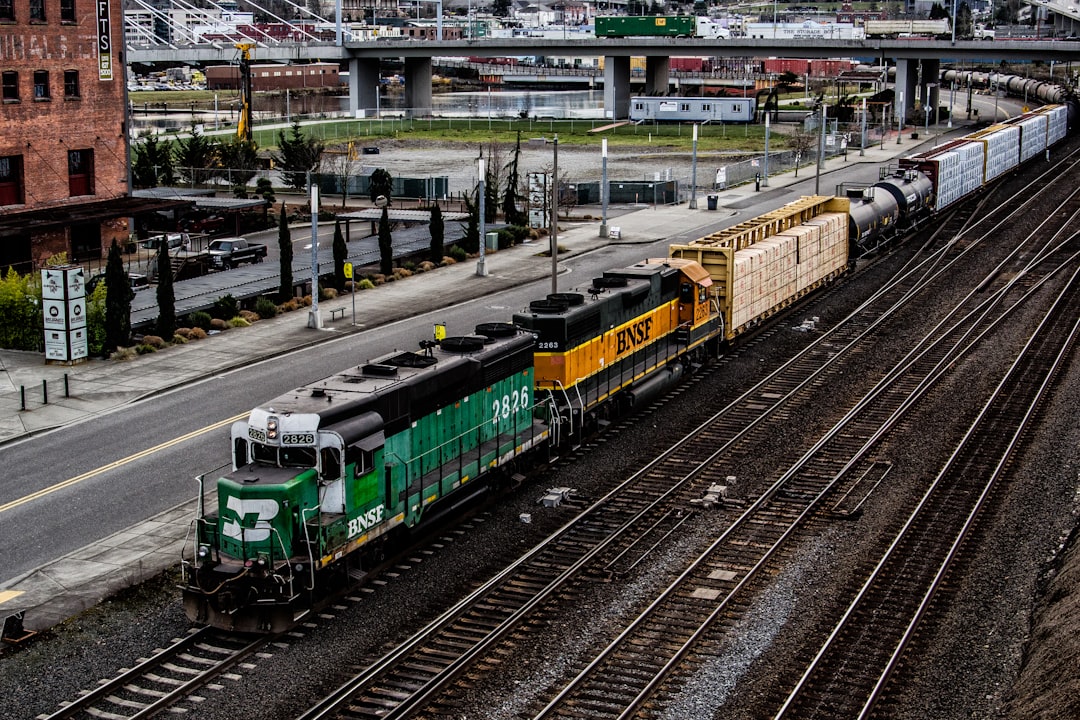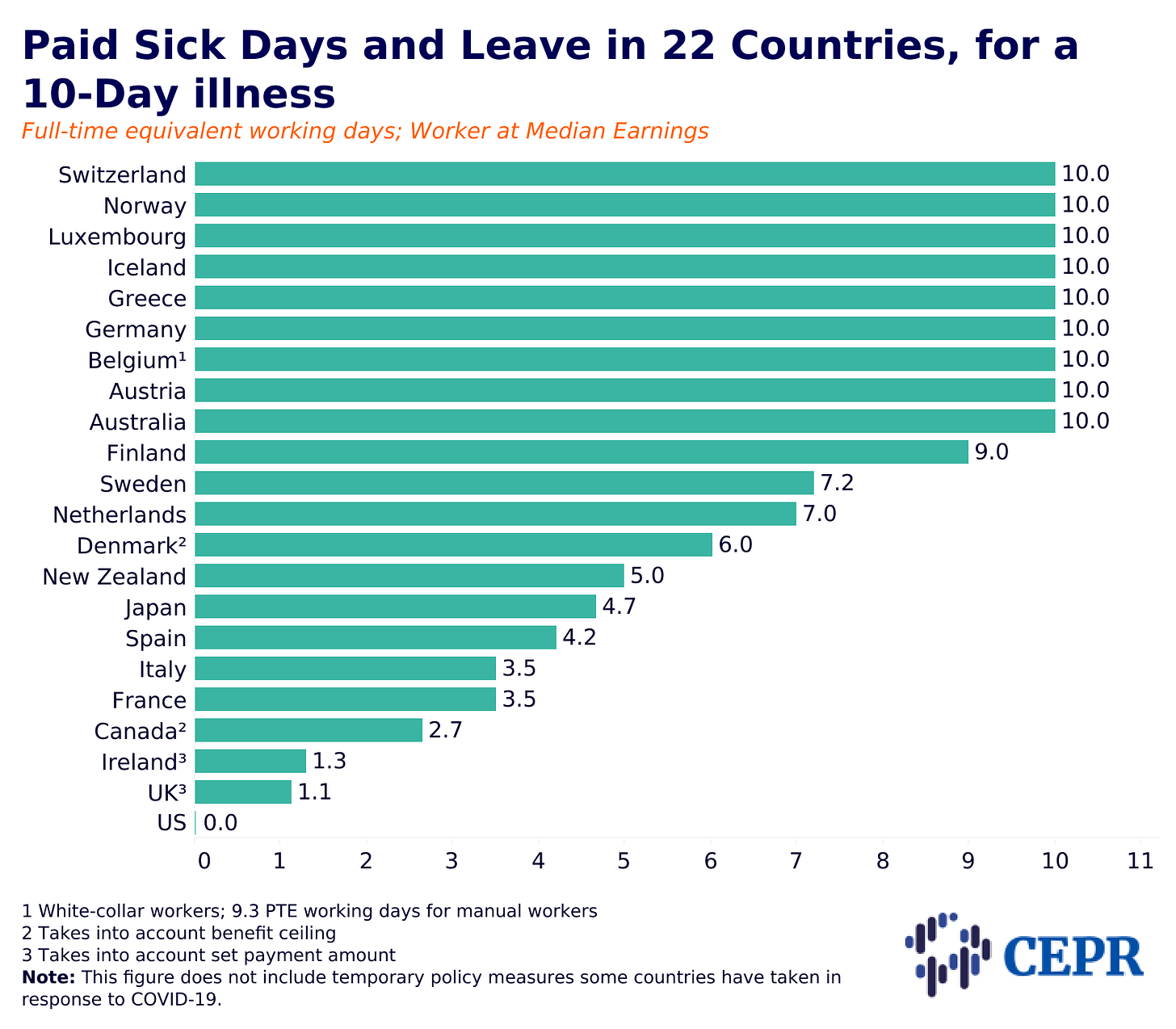Biden Derails the Rail Workers' Strike | Roundup #13
And a surprising alliance between Bernie Sanders and Ted Cruz on paid sick leave

Just last month, 48,000 University of California academic workers launched the largest-ever strike of 2022. But many had been expecting it be superseded by an even larger strike planned to start later this week.
That’s because four rail unions representing over half of all railroad workers (115,000 people) decided to reject a proposed contract with rail companies. The contract, brokered in part by the Biden administration given the economic importance of rail to the national supply chain, would give rail workers raises, bonuses, and one additional personal day, but no paid sick days.
No paid sick days. So rail workers would (continue to) not be able to take time off because they contract COVID or the flu, unless they want to incur a financial penalty or lose “points” under a new attendance policy implemented earlier this year. The lack of paid sick leave puts their economic well-being completely in odds with their health. It should probably come as no surprise that experts have found that rail workers are 2x more likely to die of COVID than other workers:


So a strike was supposed to happen this Friday, December 9. But that all changed last week, when President Biden urged congress to exercise its right to regulate interstate commerce, and force the rail industry workers to accept the negotiated contract as is.
Wait, Biden did what?
You read that right. Biden, in theory the most labor-friendly President in history, stepped in to stop a strike workers had voted for.
Biden’s issue wasn’t that these rail workers shouldn’t get paid sick leave — in fact, he supports US workers paid sick leave and included 20 days of Paid Family and Medical Leave for all workers as part of his Build Back Better plan. Instead, his plea to Congress was that a rail strike would cause a series of catastrophic chain reactions throughout the the economy, shutting down supply chains, increasing inflation, and thrusting the country into a recession.
Progressive Dems were furious, and other Democrats similarly were conflicted against going against unions, which have polled extremely highly among Americans. Railroad companies weren’t really doing themselves any favors in the public eye by making record profits during the pandemic.
But Biden ultimately prevailed against the headwinds in getting Congress to halt the strike last week. Per Bloomberg:
The Senate passed legislation to avert a crippling US rail strike on an 80 to 15 vote and sent the measure to President Joe Biden for his signature ahead of next week’s strike deadline. The vote came a day after the House approved the measure on a 290-137 bipartisan vote.
And just like that, a strike was crushed. Workers cannot (legally) strike on December 9, unless they want to get hit with hefty fines.
So can Biden and Congress just stop any strike?
No. For most unions covered by the 1935 National Labor Relations Act (NLRA), the government isn’t able to intervene to impose contracts or force workers to stop striking.
The reason Biden was able to stop the rail workers strike in particular is that they’re not covered by the NLRB — instead, they’re covered by the 1926 Railway Labor Act (RLA). The RLA outlines a special bargaining process for railroad workers and airline workers to collectively bargain with their employers, designed explicitly reduce the chance of a strike.
Basically, until the rail unions exhausts the specific negotiation and government mediation procedures in the RLA, they are not allowed to strike. Hence why the rail unions had to wait until December 9 before they could actually strike — they were in a “cooldown process” after a mediation process that began earlier this year.
In addition, if the negotiation processes set up by the RLA don’t work, it gives Congress the authority to impose whatever collective agreement it thinks is fair and even stop a strike. Congress has done so several times, but the most recent interventions were in the 1990s.
Is there any hope for rail workers getting paid sick leave?
Senator Bernie Sanders, who voted against stopping the strike, read the writing on the wall and pitched a last-ditch effort to use Congress’ powers to amend the contract and include 7 days of paid sick leave. But it failed to close the necessary votes.
Here again is Bloomberg:
An effort by Democrats to amend the deal to include seven days of paid sick leave for workers came up short when it failed to garner the Republican votes needed in the Senate. The House had endorsed the change on 221-207 vote with just three Republicans in support. The sick leave amendment, pushed by independent Senator Bernie Sanders of Vermont, failed on a 52 to 43 vote. Sixty votes were required for passage.1
While Democrats didn’t pass the bill, the vote had a surprising show of Republican support for paid sick leave. Joe Manchin was the only Dem to vote against the amendment, but 6 Republicans voted for the Sanders amendment, including Ted Cruz, Lindsey Graham, Josh Hawley, and Marco Rubio.


Josh Hawley, the celebrated power-walker, told Fox News that the failed vote was a missed opportunity for the GOP to show “we are for workers.”
A glimmer of hope, but no dice. It seems paid sick leave will not make into the rail contract.
Will we ever get a national paid leave policy?
The lack of paid sick leave in the United States, in addition to increasing the mortality rate of workers, is an international embarrassment. Unlike other developed countries, the US has absolutely no minimum requirement for employers to give their workers any paid sick leave:
This is not the “American Exceptionalism” we originally had in mind. I should also be clear that ‘we’ also includes Republicans, 79% of whom think that American workers should get paid sick leave.
The pandemic in some ways was a perfect opportunity to create a national law. The Build Back Better bill would have given American workers a historic 20 days of paid family and medical leave a year, but it failed to pass Congress.
The sad reality is that, at least from my vantage point, it is unclear when Congress will actually resuscitate that part of Build Back Better given other competing priorities. Paid sick leave — at least for now — may have to be negotiated at the state, local, and union levels.
At Workonomics, we will be following these efforts closely and sharing ways to support the campaign for paid sick leave. If you are connected with any efforts here, I’d love to get in touch.
Other News and Perspectives
Forbes: EU Law Set To Increase Gender Diversity On Company Boards
Financial Times: The Real Point of Digital Nomads
The Atlantic: Your Creativity Won’t Save Your Job From AI
Shopify: New Company Tool Allows Employees to Better Allocate between Salary and Equity
Jackson Lewis: New York Student-Athletes Benefit From Their Name, Image, and Likeness Under New Law
ILR Review: Labor-Market Concentration and Labor Compensation
International Labour Organization: Global wages fell in 2022 by 0.9%
Nature: The Scandal of Researchers Paid Less Than a Living Wage
L&E Global: Unions Continue Gains at U.S. Manufacturers in Mexico Under Mexican Labor Law Reform
Sixty votes are required in the Senate in order to overcome the filibuster and force a vote.



